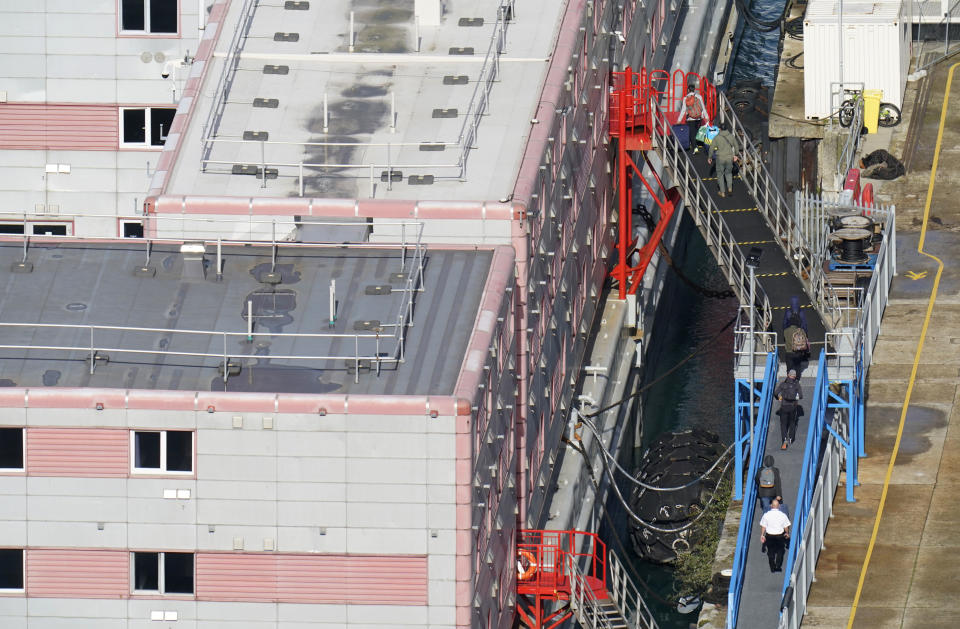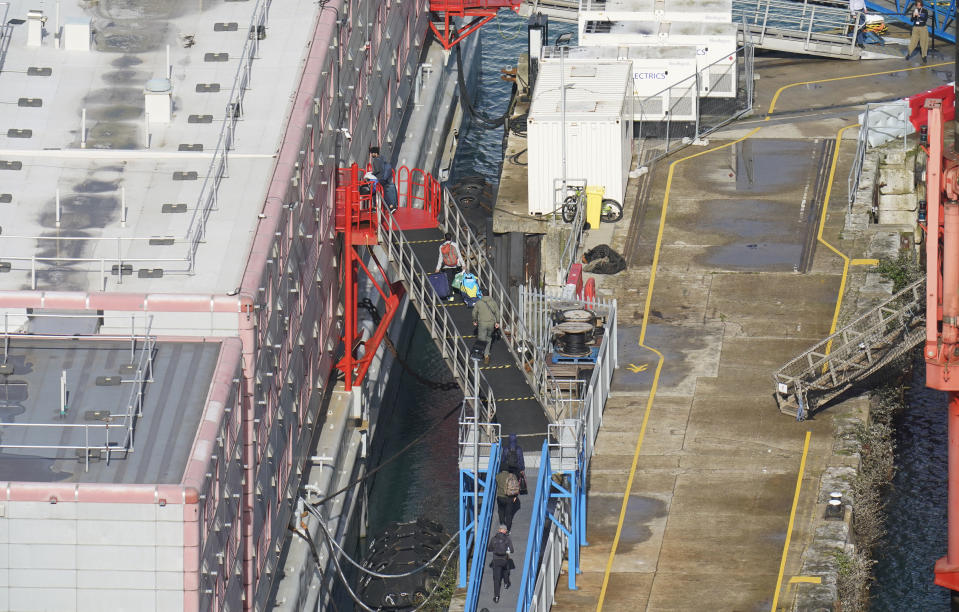Asylum seekers return to a barge off England's south coast following legionella evacuation
LONDON (AP) — Asylum seekers started returning Thursday to the barge moored off the south coast of England, more than two months after it had to be evacuated following the discovery of legionella bacteria, which can cause serious illness, in the water supply.
As a coach arrived carrying the first group of asylum seekers to return to the Bibby Stockholm, protesters gathered at the gates of Portland Port, which is around 140 miles (225 kilometers) southwest of London, to decry what they view as the “inhumane” conditions aboard.
All but 10 of the 39 men evacuated are believed to have returned, though they arrived later than planned after the coach was deliberately blocked by Just Stop Oil protesters, who argue that the climate crisis will inevitably lead to more migration around the world.
Critics say the barge, which has a capacity of 504 people, is potentially a fire hazard and treats residents as though they are in prison.
“They hate it: they say it feels like a prison, some hate being on the sea, they find it very difficult to leave and they are completely separated from the community," said Candy Udwin from the Stand Up To Racism grouping.
Britain’s Home Office said the use of vessels is “a tried and tested approach” to housing asylum-seekers around Europe, as well as offering value for money — a claim dispute by the non-profit organization Reclaim the Sea.
The Home Office said the barge could open its doors again after tests for the bacteria and improved fire safety protocols had been completed.
“The number of people on board will increase gradually with more arrivals in the coming days and months, as part of a carefully structured, phased approach," a spokesperson for the department said.
On Aug. 11, authorities had to evacuate the first residents after legionella bacteria was found in the water system — just days after they had gone aboard.
It was an embarrassing turn of events for the governing Conservative Party, which is taking a hard-line approach to asylum-seekers. The disease warning was the latest setback for its much-publicized plan to move asylum seekers onto the barge from more costly hotel accommodation around the country.
Many of those who will be housed in the Bibby Stockholm arrive on overcrowded dinghies and other small craft that make the often dangerous and deadly crossing from northern France in the hope to live in the U.K. According to government figures, there were nearly 45,000 people detected arriving by small boats in the year ending June 2023, 26% higher than the previous year.
Prime Minister Rishi Sunak has made “ stopping the boats ” a priority ahead of an election expected to take place next year. His government, which is trailing badly in most opinion polls, has proposed sending asylum seekers to Rwanda as a way to discourage people from making the journey, but the plan is stalled in the courts.
The Bibby Stockholm, which the government is leasing from a private company, has previously housed workers from various industries, including crews on oil rigs.
With three stories of closely packed bedrooms opening off long hallways, the barge resembles a college dormitory. It is equipped with a kitchen, dining area and common rooms. The Home Office said the barge will be operational for at least 18 months and stay berthed in the port during that time.
Legionnaires’ disease is a serious respiratory infection caused when people inhale tiny water droplets containing the legionella bacteria. It is not transmitted person-to-person, but is found in the cooling systems of large buildings and water lines that are not in regular use. While symptoms are similar to the flu, legionnaires’ disease can be treated with antibiotics.
___
Follow AP’s coverage of global migration at https://apnews.com/hub/migration



